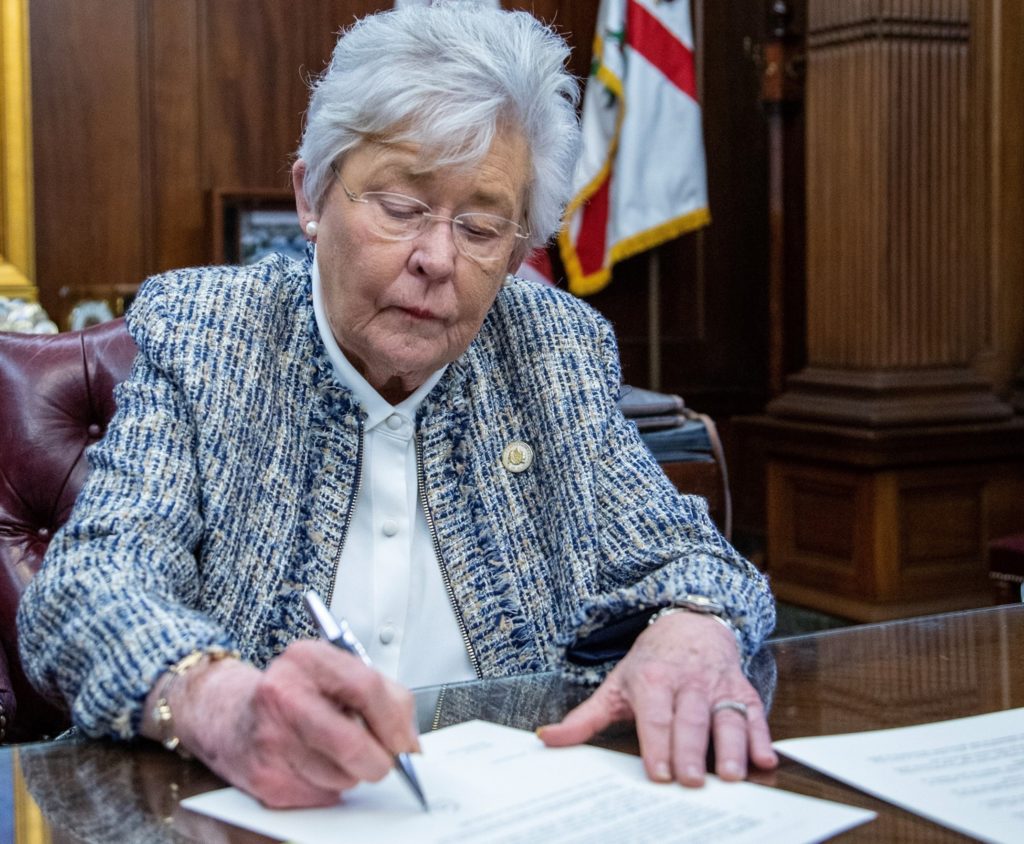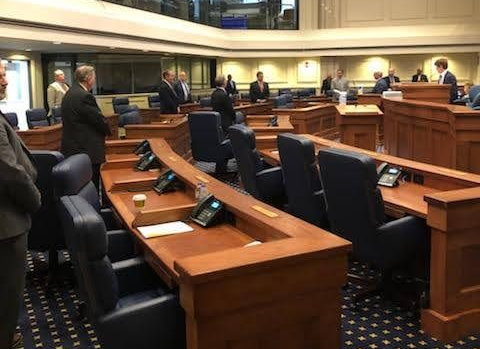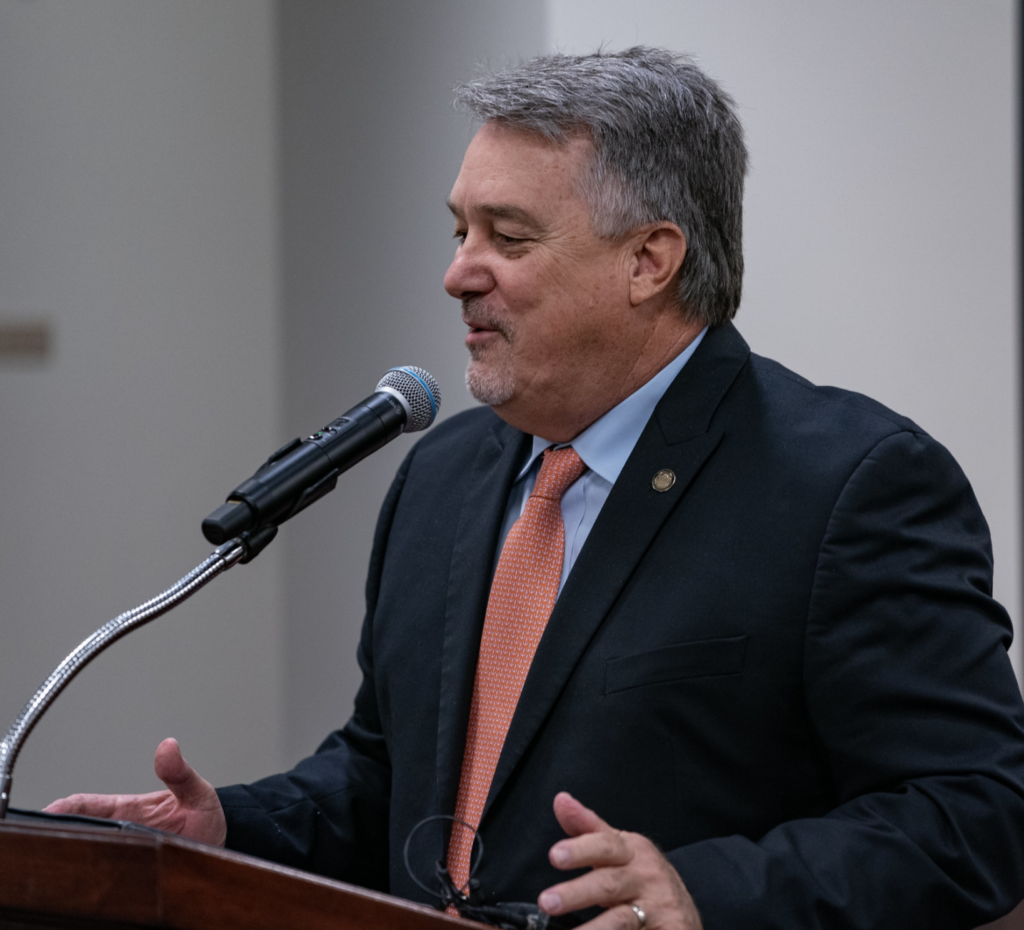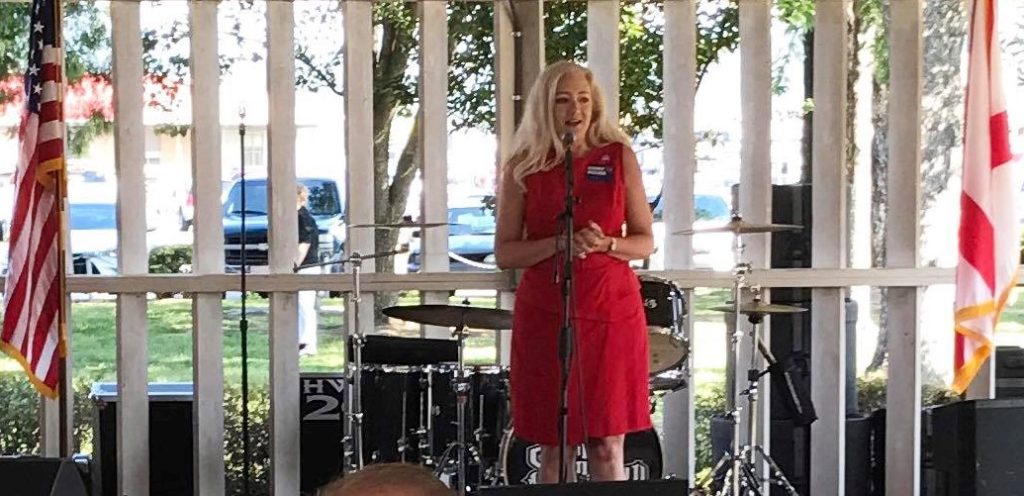Governor will host a ceremonial bill signing for legislation passed during 2023 Regular Session

On Tuesday, Alabama Governor Kay Ivey will host a series of bill-signing ceremonies to celebrate the passage of several pieces of legislation that addressed concerns facing the state of Alabama. Ivey will sign several bills, including reform of the state’s adoption laws. House Bill 101 (HB 101) is sponsored by State Representative Ginny Shaver and State Senator Arthur Orr. This bill streamlines the state’s adoption process and updates the current adoption law language. (Act 2023-092). “Alabama has consistently set state records for adoptions and placed thousands of children in loving, forever homes,” said Gov. Ivey. “Currently, we have more than 5,000 children in the foster care system, and with this modernized and streamlined process now in place, we have positioned Alabama on even firmer footing and will be able to provide more of our children with the life they deserve.” House Bill 66 (HB66) by Rep. Joe Lovvorn and Sen. Andrew Jones allows certain firefighters, law enforcement officers, and correctional officers, covered under the ERS or TRS, to purchase hazardous duty time for prior service. (Act 2023-101). HB66 removes the time limitations for Tier I firefighters, law enforcement officers, and correctional officers covered under the Employees’ Retirement System or the Teachers’ Retirement System to purchase eligible service credit prior to January 1, 2003. House Bill 164 (HB164) by Rep. Andy Whitt and Sen. Jay Hovey requires high school students to complete a personal financial literacy and money management course before graduation. (Act 2023-179). “I have got story after story from thirty years of banking experience of young people who did not have a checking account,” said Whitt. “They go to convenience stores and check cashing places to get their paychecks cashed. One young fellow was working two hours a week just to be able to get his check cashed each week.” Senate Bill 131 (SB 131) by Sen. Vivian Figures and Rep. Steve Clouse. This bill transfers the regulation of preneed funeral contracts from the Department of Insurance to the Alabama Board of Funeral Services. (Act 2023-094). The Alabama Preneed Funeral and Cemetery Act of 2023 transfers the existing Preneed Funeral and Cemetery Act and the regulation of preneed contracts from the Commissioner and Department of Insurance to the Alabama Board of Funeral Service. It authorizes the Department of Insurance to temporarily transfer certain funds to the board to defray costs associated with the administration and operation of the Alabama Preneed Funeral and Cemetery Act of 2023; Senate Bill 28 (SB28) by Sen. Tim Melson and Rep. Randy Wood would expand the scope of practice of podiatry to include treatment of the foot and ankle. (Act 2023-106). Podiatrists in most states are already allowed to treat disorders of the ankle. This expansion of the scope of practice to come in line with national standards was long overdue. Senate Bill 104 (SB 104) by Sen. Chris Elliott and Rep. David Faulkner revises the current Dram Shop Act by addressing liability for providers of alcohol if a recipient injures a third party. (Act 2023-025) . Before this, only three insurance carriers would insure restaurants and bars from lawsuits due to the liability. This will make it harder for plaintiffs’ attorneys to prove a case against the establishment that sold the alcohol. House Bill 56 (HB56) by Rep. Frances Holk-Jones and Sen. Linda Coleman-Madison will expand the scope of practice for licensees of the Alabama Board of Social Work Examiners. (Act 2023-100). This will allow specially trained social workers with master’s degrees to diagnose mental illnesses. House Bill 62 (HB 62) by Rep. Ben Robbins and Sen. Keith Kelley will extend the amount of time that nonprofit veterans’ organizations have to comply with state and local building codes when acquiring a former armory building. (Act 2023-175). This bill primarily deals with an armory in Sylacauga owned by the American Legion and used by the Alabama National Guard. When the National Guard shut down its presence, it transferred back to the American Legion. The NG never updated the building during its tenure, so it lacks the sprinkler system needed to comply with state building code requirements. Tuesday will be day 24 of the 2023 Alabama Regular Legislative session. Kay Ivey has been governor since 2017. To connect with the author of this story or to comment, email brandonmreporter@gmail.com.
Gov. Kay Ivey signs adoption reform bill

On Tuesday Alabama Governor Kay Ivey signed legislation that will update and reform Alabama’s adoption laws. “Alabama is, once again, putting families first and taking action to solidify us as the most pro-life state in the nation,” said Gov. Ivey. “Alabama has consistently set state records for adoptions and placed thousands of children in loving, forever homes. Currently, we have more than 5,000 children in the foster care system, and with this modernized and streamlined process now in place, we have positioned Alabama on even firmer footing and will be able to provide more of our children with the life they deserve. This bill has been over four years in the making, and I commend Rep. Ginny Shaver and her colleagues in the Alabama Legislature, as well as the Alabama Law Institute, for making this a top priority and fighting for our state’s children.” House Bill 101 will modernize and improve the state’s adoption process. HB101 was sponsored by State Rep. Ginny Shaver. The adoption reform legislation was carried in the Alabama Senate by State Senator Arthur Orr. “This is a Law Institute (ALI) bill,” Shaver said. “I started working on a bill and found out that they already had a committee working on rewriting the state’s adoption code.” “Alabama’s adoption law has not been touched in 30 years,” Shaver said. The rewritten 80-page bill “is very comprehensive and detailed.” The Legislation includes some protections for parents who have religious, moral, or other concerns about vaccinations can participate in foster and adoptive care. The bill states, “The Department of Human Resources shall provide by rule the process through which an individual seeking to participate in foster care or adoption may apply for an exemption from any vaccination requirement for religious or other appropriate reason for himself, herself, or any other individual in his or her household.” “This has been a long time coming,” Orr said of the legislation. “We will move children more rapidly through the process of adoption and will remove needless hurdles.” Thursday was day 18 of the 2023 Alabama Regular Legislative Session. To connect with the author of this story or to comment, email brandonmreporter@gmail.com.
Adoption bill passes Senate with vaccination amendment attached

On Thursday, the Alabama Senate passed legislation simplifying Alabama’s complex adoption laws, speeding up the process of children finding permanent homes. The Senate included an amendment that would allow families with vaccine skepticism to be able to be involved in the foster care program. House Bill 101 is sponsored by State Rep. Ginny Shaver. The adoption reform legislation was carried in the Alabama Senate by State Senator Arthur Orr. “This is a Law Institute (ALI) bill,” Shaver said when the bill was in committee. “I started working on a bill and found out that they already had a committee working on rewriting the state’s adoption code.” Shaver explained that the Alabama Law Institute had a committee of judges and lawyers who met on a conference call every two weeks for the last four years to modernize and improve Alabama’s existing adoption statutes. “Alabama’s adoption law has not been touched in 30 years,” Shaver said. The rewritten 80-page bill “is very comprehensive and detailed.” Shaver said that the new legislation divided minor adoptions versus adult adoptions. It also clarifies which court is the proper court, allows courts handling adoptions to work together and communicate, allows for electronic communication, provides rules for a contest of adoptions in certain situations, and clarifies procedures about relatives and stepparents who adopt a minor. Orr did add some amendments in the Senate. The first was a “technical amendment” and came from ALI and Shaver. “This came from ALI and Rep. Shaver, the sponsor,” Orr explained. “It cleaned up some wording about grandparents.” The second amendment deals with vaccinations and was negotiated by Orr with the Alabama Department of Human Resources (DHR). “I spent a good while talking to Commissioner [Nancy] Buckner, and she and the Department support this,” Orr said. “It is not the same amendment that was offered in the House that there was some controversy about.” “The Department of Human Resources shall provide by rule the process through which an individual seeking to participate in foster care or adoption may apply for an exemption from any vaccination requirement for religious or other appropriate reason for himself, herself, or any other individual in his or her household.” The Senate adopted both of the amendments. “This has been a long time coming,” Orr said of the legislation. “We will move children more rapidly through the process of adoption and will remove needless hurdles.” Sen Rodger Smitherman said, “I want to commend ALI. ALI is a collection of legal minds from all over the state.” “I am on the ALI board of directors, so I got to see the committee work on this,” Smitherman said. Orr said that the legislation has “lots of changes” to Alabama’s adoption laws “that will certainly expedite the process.” “I would like to thank DHR. They have a lot of challenges,” Orr said. The Senate voted to pass HB101 30 to 0. The legislation now goes back to the Alabama House of Representatives for them to consider the changes that were made by the Senate. The Legislature will return on Tuesday for the 11th legislative day of the 2023 Alabama Regular Legislative Session. To connect with the author of this story or to comment, email brandonmreporter@gmail.com.
House passes major rewrite of adoption laws

On Thursday, the Alabama House of Representatives voted in favor of a massive rewrite of Alabama’s adoption laws. Sponsors say the rewrite will make adoptions faster, more economical, and less complicated. House Bill 101 (HB101) is sponsored by State Representative Ginny Shaver. Shaver told reporters, “Cutting down on the court procedures and filings will save money, but it has a bigger savings on time.” The bill decreases the time in a child abandonment case before that child can be put up for adoption from six months to four months. “It is a big-time savings, which is hugely important in getting children into a permanent home as soon as possible,” Shaver said. The Alabama Law Institute has had a committee working on modernizing and improving the laws for adoptions for four years to develop this rewrite of the existing adoption statutes. “This is not a Ginny Shaver bill. This is a Law Institute bill,” Shaver said. “They were the experts that know all the ins and outs.” “It has not been changed much in the last thirty years,” Shaver said. “(This legislation) can save up to two years of time. It identifies the proper court to terminate parental rights. It also allows the courts to use electronic communications.” “It specifies that if a married couple wishes to adopt, that both parents have to appear on the petition to adopt,” Shaver said. “We are all touched by adoptions in one way or the other,” Shaver said. “I have a sister who was adopted.” The House passed House Bill 101 and House Bill 1, which raised the penalties for fentanyl trafficking, during this first week of the regular session. Speaker of the House Nathaniel Ledbetter said, “We have changed lives for generations to come. These were my top two priorities. I am excited to get those two major bills passed out of the House.” Ledbetter said that updating the adoption law has needed to be done for years. “I think there was urgency,” Ledbetter said. “It has been a process that has been going on for four years. It should have been corrected a long time ago. Rep. Matt Simpson, an attorney, told reporters, “I am ecstatic. Adoption is part of the practice that I do. That adoption committee met every other week for four years. You had probate judges from all over the state. You had attorneys on that zoom call working on that.” “Adoptions are difficult, and they shouldn’t be,” Simpson said. “It doesn’t need to cost $40,000 to $50,000 to get an adoption done.” Shaver said that presently the state has 5,700 children being cared for by the state, but only 220 are currently available for adoption. “Are all of these children in foster care?” Rep. Laura Hall asked. Shaver replied, “They (the 5,700 kids) would be in some sort of supported system, whether it is foster care or a children’s home.” Shaver said that this legislation speeds up adoptions because it allows different courts to communicate with each other electronically and by decreasing the time in child abandonment cases from six months to four months. Hall said, “We must find a way. We must find the resources so that we are providing all that child needs.” Shaver explained, “Adoptions start in probate courts, but parental rights termination goes to juvenile court. If there is a challenge, it goes to juvenile court.” State Rep. Ernie Yarbrough attempted to bring an amendment that would have banned any vaccination requirements for people who want to be foster parents. “I love the bill, and I am totally for the bill,” Yarborough said. “Most of the adoptions that happen in the state are foster adoptions. I have a lot of my constituents who are not allowed to participate in the foster-to-adoption process because they are opposed to vaccine mandates.” Yarborough argued that Alabama’s adoption and foster care process “should be free from vaccine mandates.” Shaver said, “This bill has been worked on for four years. You should bring this as a separate bill. There are unintended consequences from this, including decreasing our federal funds.” At Shaver’s request, the House voted to table the Yarborough amendment 58 to 24. Health Freedom Alabama wrote on Facebook afterward, “The majority voted to kill the amendment and it did not pass. The majority of the House members did not see value in removing vaccine status discrimination policies that actually limit the number of families willing and able to adopt or foster to do so.” “I was not taking any amendments from the floor,” Shaver told Alabama Today afterward. “They need to bring their own bill.” HB101 passed the Alabama House of Representatives 105 to 0. 99 members signed on as co-sponsors. “I am glad to get it across the finish line,” Shaver said. “It has been a long time coming.” HB101 now goes to the Alabama Senate for their consideration. To connect with the author of this story or to comment, email brandonmreporter@gmail.com.
House committee advances bill to overhaul Alabama’s adoption laws

On Wednesday, the Alabama House Children and Seniors Advocacy Committee gave a favorable report to a bill to replace Alabama’s existing adoption statutes with new code language that sponsors claim will make the adoption process faster, less burdensome, and more affordable. House Bill 101 (HB101) is sponsored by State Representative Ginny Shaver, who Chairs the committee. “This a Law Institute (ALI) bill,” Shaver said. “I started working on a bill and found out that they already had a committee working on rewriting the state’s adoption code.” “The committee has worked for over four years,” Shaver explained, “The Committee has brought in stakeholders from all over the adoption field.” “I started working with the committee in 2021, not to write the bill, but to learn,” Shaver said. “Alabama’s adoption law has not been touched in 30 years.” Shaver said the rewritten 80-page bill “is very comprehensive and detailed.” “The goal was to update the language and streamline the process and protect the confidentiality of the parties,” said Shaver. “To put it as simply as I can, this bill repeals that current adoption code and replaces it.” Shaver said that the new legislation divided minor adoptions versus adult adoptions. It also clarifies which court is the proper court, allows courts handling adoptions to work together and communicate, allows for electronic communication, provides rules for a contest of adoptions in certain situations, and clarifies procedures about relatives and stepparents who adopt a minor. “My concern about adoption is to make it simpler and also to save time and money,” Shaver said. “We want to do everything possible to get a child into a permanent home as soon as possible.” “This streamlines the process and provides clarity to make it better going forward,” Shaver said. State Rep. Barbara Boyd said, “When you are changing codes, you really don’t know what we are voting on unless you are an attorney. I read the whole bill, but I still don’t understand it. In my opinion, it is not a good job.” “We did have a summary, and the Law Institute did provide answers to questions after each section,” Shaver said. State Rep. Randall Shedd, “I want to thank you for your work. A lot of people worked hard on this bill. It may not be a perfect bill, but it is real close to it.” State Rep. Barbara Drummond told reporters at a minority caucus press event afterward, “This bill is a Law Institute bill that overhauls the whole code on adoption.” The committee voted to give HB101 bill a favorable report as amended. The committee also voted to give a favorable report to House Bill 103 (HB103), which is sponsored by State Rep. Allen Baker. “This is an adoption-related bill,” Baker said. “This bill would authorize sick leave for state employees to deal with issues related to adoption.” Boyd asked, “How does this bill differ from current law?” “This clarifies more than changes,” Baker said. “This adds clarity. To this point, this has been up to the discretion of the agency.” Drummond asked, “Is higher ed in there?” Baker said the community college system and four-year higher education institutions were included. Two technical amendments were approved by the committee. HB103 received a favorable report from the Committee in a unanimous vote. Both HB101 and HB103 could be considered by the full House of Representatives as early as Thursday. Thursday will be day four of the 2023 Alabama Regular Legislative Session. Regular sessions are limited to no more than thirty legislative days. To connect with the author of this story or to comment, email brandonmreporter@gmail.com.
Steve Flowers: Women rule in Alabama politics

For many years, Alabama has been ridiculed in national publications for having fewer women in political leadership positions than others assumed to be progressive states. States like Colorado, New York, and California were lauded for having an inordinate number of females in public office. Well, folks, take a cursory look around at Alabama’s political landscape, and it is a new day in the Heart of Dixie, and unlike the above-mentioned liberal states, our slate of women leaders are conservative Republicans. Our top two most powerful leaders in the state are Governor Kay Ivey and U.S. Senator Katie Britt. If you include PSC President Twinkle Cavanaugh into the mix, then the three most powerful and popular political leaders in the Heart of Dixie are women Republicans. You can eat your heart out, Colorado. This day did not just happen. These three women have been on the scene and the horizon for a while and arose the old-fashioned way by rising through and within the system to get to the top of the class. Kay Ivey was a student leader at Auburn. She spent a decade or more working with the legislature as the lobbyist for the Alabama Commission on Higher Education; then ran for and was elected State Treasurer and served eight years. She then was elected Lt. Governor, where she served for six years. She has been governor now for almost six years. Twinkle Cavanaugh has been on a leadership track since her high school years in Montgomery. She became Chairman of the Alabama Republican Party at a young age and has been President of the Public Service Commission for over a decade. She is the hardest working political figure in office in Alabama with a hardcore grassroots organization. Katie Britt also won our U.S. Senate seat the old-fashioned way. She worked hard and built a statewide grassroots organization that will hold her in good stead for years to come. All three of these ladies are conservative yet rational and reasonable leaders. They are exemplary of Southern grace, yet decisive, disciplined, and dignified. They are people we can be proud of and excellent role models. All three are Alabama born and bred and know the folks of Alabama. All three are closely aligned with and have proudly been supported by Alabama’s premier and most powerful and respected political organization, the Alabama Farmers Federation (Alfa). Currently, two of the most prominent jurists on the Alabama State Supreme Court are females. Justices Kelli Wise and Sarah Stewart grace the Court. I can see our Supreme Court in Alabama, as well as the United States Supreme Court, being majority female in future years. The majority of law students and graduates throughout the country are female. Women will dominate this profession in the next decade, if not already. The State Senate has two very prominent female leaders. The most powerful and proficient is veteran Mobile State Senator Vivian Figures. Senator April Weaver from Bibb/Shelby is on a fast track in the Alabama Senate. Another sign of women taking their rightful place in the Alabama Legislature is the takeover of Republican House Seats in the Shelby and Baldwin County Republican suburban districts. There were five new Republican women in these two Republican bastions that all took seats previously held by older men. Susan Dubose and Leigh Hulsey will be joining three females from Baldwin County. All three of the Baldwin County GOP seats will be held by female Republicans, including Jennifer Fidler, Donna Givens, and Frances Holk-Jones. Representative Cynthia Almond (R-Tuscaloosa), a relative newcomer, is a star on the horizon. Three of the most prominent leaders in the House of Representatives are women. Representative Margie Wilcox of Mobile is in a leadership position. Representative Ginny Shaver of Cherokee County works extensively on family and adoption issues. Representative Terri Collins of Morgan County is the education guru in the Alabama House. Speaking of education, our Alabama State Board is currently made up of eight female members and only one man. This eight-to-one female majority really becomes nine-to-one because Governor Kay Ivey serves as ex-officiate Chairman of the Board of Education. So, folks, as you can see, women rule in Alabama politics, and my guess is that this trend will not diminish in years to come. See you next week. Steve Flowers is Alabama’s leading political columnist. His weekly column appears in over 60 Alabama newspapers. He served 16 years in the state legislature. Steve may be reached at www.steveflowers.us.
Nathaniel Ledbetter announces third round of committee chairmanships

State Rep. Nathaniel Ledbetter announced his third round of intended committee chair appointments on Wednesday. Ledbetter was chosen to be the next Speaker of the House in November by the Alabama House Republican Caucus – which holds a commanding supermajority in the Alabama House of Representatives. The Republicans hold a 77 to 28 supermajority in the Alabama House of Representatives, so the selection of the House Republican Caucus will almost certainly be elected as the next Speaker of the House when the Legislature meets for its organizational session in January. Ledbetter has appointed Rep. Ginny Shaver as Chair of the Children and Senior Advocacy Committee. Ledbetter also appointed Rep. Chris Blackshear to chair the Financial Services Committee. Rep. Matt Simpson was appointed to chair the House Ethics and Campaign Finance Committee. Simpson is an attorney and former prosecutor. Rep. David Standridge will chair the Rural and Urban Development Committee. Standridge is the longtime chair of the House Rural Caucus. Rep. Corley Ellis was appointed to chair the House Insurance Committee. State Rep. Chris Sells will serve as the chairman of the State Government Committee. State Rep. Andy Whitt will be the chairman of the Economic Development and Tourism Committee. State Rep. Allen Treadaway will continue to chair the Public Safety and Homeland Security Committee. Treadaway is a retired Birmingham City assistant police chief. “These appointments represent a mix of veteran chairs with valuable experience and newly appointed members of the leadership team with fresh perspectives,” Ledbetter said. “All of them have the knowledge and skills necessary to lead their committees and ensure that bills and measures are well vetted before reaching the House floor.” All of Ledbetter’s appointments will formally go into effect once he is elevated to Speaker once the full body is in session for the organizational session. To connect with the author of this story, or to comment, email brandonmreporter@gmail.com.
The NRA Political Victory Fund announces primary endorsements

The NRA Political Victory Fund (NRA-PVF) has announced its endorsements for the May 24 primary in Alabama. The NRA-PVF is NRA’s political action committee. The NRA-PVF ranks political candidates – irrespective of party affiliation – based on voting records, public statements, and their responses to an NRA-PVF questionnaire. Mo Brooks received the endorsement and A rating for the U.S. Senate seat and incumbent Rep. Mike Rogers got an A rating and was endorsed for the U.S. House of Representatives. For the governor’s race, the group gave an A rating and endorsement to incumbent Kay Ivey. Incumbents continued to take the top spots in the Attorney General, State Senate, and House of Representatives elections. AG Steve Marshall received an A rating along with incumbent State Senators Tim Melson (Dist. 1), Tom Butler (Dist. 2), Steve Livingston (Dist. 8), Randy Price (Dist. 13), Dan Roberts (Dist. 15), Shay Shelnutt (Dist.17), Tom Whatley (Dist. 27), and Mike Jones (Dist.31). For the State House of Reps., the following incumbents received an A rating and endorsement: Phillip Pettus (Dist. 1), Parker Moore (Dist. 4), Proncey Robertson (Dist. 7), Tim Wadsworth (Dist. 14), Tommy Hanes (Dist. 23), Nathaniel Ledbetter (Dist. 24), Gil Isbell (Dist. 28), Debbie Wood (Dist. 38), Ginny Shaver (Dist. 39), Dickie Drake (Dist. 45), Jim Carnes (Dist. 48), Brent Easterbrook (Dist. 65), Jeff Sorrells (Dist. 87), Will Dismukes (Dist. 88), Rhett Marques (Dist. 91), and Matt Simpson (Dist. 96). State House of Rep. candidates that are not incumbents that received an A rating and an endorsement include Michael Hart (Dist. 49) and Troy Stubbs (Dist. 31). For the Sheriff’s elections, the following candidates received an A rating and endorsement: Max Sanders (Lawrence County), Joshua McLaughlin (Limestone County), Eric Balentine (Colbert County), and Matt Gentry (Cullman County).
Steve Flowers: Incumbency prevails in 2022 State House races

Folks, believe it or not, we are closing in on six months before next year’s election year. The primary election is set for May 24, 2022. In Alabama, all our major constitutional officers are on the ballot next year. The governor’s office is the premier race in the state, and that coveted and powerful post is set for its four-year quadrennial run. Therefore, this big political year is referred to as the gubernatorial year. Those of us who follow Alabama politics have been salivating with anticipation for a cavalcade of great races. However, the power of incumbency has devasted the big year into a yawn. All the major state offices are held by popular incumbents, who are either running unopposed or have minimal opposition. The consolation prize was that there would be the legislative races. After all, this is where the real power in the state rests. You can simply look at where the special interest and PAC money is spent to verify that fact. However, the omnipotent power of incumbency has also encroached on those races. The Alabama House of Representatives has 105 members. There are 77 Republicans and 28 Democrats. The large majority of incumbents are running for reelection – both Republicans and Democrats. The overwhelming majority of these incumbents will have no opposition. However, in the House, there will be some major changes in leadership because of retirement or moving on to new posts. Speaker of the House Mac McCutcheon is not running for reelection. This has created an interesting and spirited race within the Republican Caucus ranks for Speaker. In addition, Victor Gaston of Mobile, who is Speaker Pro Tem, is also retiring. Bill Poole of Tuscaloosa, who chaired the powerful House Ways and Means Education Budget Committee, has left the House to be the State Finance Director. House Rules Committee Chairman Mike Jones of Andalusia is running for the open Senate seat of retiring Senator Jimmy Holley. Two of the freshman House members are running for statewide office. Wes Allen of Troy is running for Secretary of State, and Andrew Sorrell of Tuscumbia is running for State Auditor. In addition, Connie Rowe of Jasper is leaving the House to become an administrative assistant to Lt. Gov. Will Ainsworth. Some of the veteran House members who are choosing to hang up their legislative cleats include Howard Sanderford of Huntsville, Mike Ball of Huntsville, K.L. Brown of Jacksonville, Kerry Rich of Marshall, Allen Farley of Jefferson, Harry Shiver of Baldwin, Mike Holmes of Elmore, and Becky Nordgren of Etowah. The most noteworthy retiree may be Representative Steve McMillan of Baldwin County, who is retiring after serving close to 43 years in the House. Steve has been a quiet yet very effective voice for the people of Baldwin County. They all will be missed. Some of the high profile and powerful members of the House, who will return for another four years with no or token opposition, are Steve Clouse of Ozark, Nathaniel Ledbetter of Dekalb County, and Danny Garrett, Jim Carns, David Wheeler, and David Faulkner of Jefferson. Danny Garrett has ascended to Chairman of the House Ways and Means Education. Other leaders returning are Chris Pringle, Reed Ingram, Randall Shedd, Tracy Estes, Chris Sells, David Standridge, Ginny Shaver, Jim Hill, Alan Baker, Joe Lovvorn, Chris Blackshear, Kyle South, Paul Lee, Jeff Sorrells, Rhett Marques, Steve Hurst, Joe Faust, and Margie Wilcox. The Democratic leadership will remain intact. There is an illustrious array of House Democratic leaders, including Anthony Daniels, Chris England, Laura Hall, Peb Warren, Barbara Boyd, A.J. McCampbell, Berry Forte, Dexter Grimsley, Thomas Jackson, Kevin Lawrence, Mary Moore, Juandalynn Givan, and veteran John Rogers. Two of the Democratic House veterans from Jefferson County, Louise Alexander and Merika Coleman, are both running for an open Jefferson County Senate Seat, leaving both their House seats up for grabs. There may be an increase in the number of females in the House of Representatives. It has already begun with the election of Cynthia Almond of Tuscaloosa, who was elected without opposition to replace Bill Poole. In addition, Patrice Penni McClammy won the Montgomery District 76 seat of her late father, Thad McClammy. She won with no opposition. See you next week. Steve Flowers is Alabama’s leading political columnist. His weekly column appears in over 60 Alabama papers. He served 16 years in the state legislature. Steve may be reached at www.steveflowers.us.
House approves ‘born alive’ abortion bill

Doctors could face prison sentences if they fail to try to save babies “born alive” after an attempted abortion, under a bill approved Thursday night by the Alabama House of Representatives. Lawmakers voted 76-12 for the bill by Republican Rep. Ginny Shaver of Leesburg. It now moves to the Alabama Senate. Shaver argued the law was needed to protect babies while opponents of the bill said the legislation was unneeded because what Shaver was describing is already illegal. “Laws already exist to protect children from the moment they are born and exit the womb and there’s absolutely no loophole that would allow infanticide without severe criminal penalty,” said Rep. Neil Rafferty, D-Birmingham. Shaver, who worked at a crisis pregnancy center, said she heard of a case where a doctor did not aid a baby that was living after an abortion attempt. Democrats pressed for details, but Shaver said she could not disclose them for privacy reasons. “This is not about abortion. This is about a baby’s right to life,” Shaver said. Alabama doesn’t allow abortions at or after 22 weeks of pregnancy as measured by the woman’s last menstrual period. According to the American College of Obstetricians and Gynecologists, babies born before 23 weeks of pregnancy usually do not survive with very rare exceptions. Republished with the permission of the Associated Press.
Ginny Shaver announces run for Alabama House District 39

Lifelong conservative, Republican Ginny Shaver announced Saturday she is running for the Republican nomination for the Alabama House of Representatives District 39 seat. “I’m proud to be a 5th generation Alabamian, and District 39 has been our home for the past 34 years,” Shaver said in a statement. “During that time our regional political landscape has transformed to a solid conservative majority and our representation should reflect that change. President Trump was elected because people are tired of political insiders and special interests in all levels of government. That is why I must step forward now and give the voters a clear choice and an opportunity to elect one of the people, for the people.” Hailing from Leesburg, Ala., Shaver is a Certified Municipal Clerk and currently works for the City of Gadsden. She previously served as Town Clerk of Leesburg. Known for being a community activist and volunteer, she is president of the Cherokee County Republican Women and vice-chair of the Cherokee County Republican Executive Committee. Recently, she was appointed to the Cherokee County Industrial Development Board and formerly worked with the Gadsden Airport Authority. Shaver believes there are tough issues to be faced, and the citizens of District 39 deserve a representative who will consider how every piece of legislation will affect the constituents. Her top priorities are support for education and jobs. Ginny is married to Jeff Shaver, and is the mother of three adult children: Jake, Jennilee and Harry. Ginny and Jeff, who have been married for 36 years, are members of Tates Chapel Baptist Church. “After devoting my life to supporting my husband, raising our children, and working in the public and private sector, I now feel the time has come for me to use my experience and leadership ability to represent the interests of the people of District 39,” added Shaver. House District 39 encompasses all of Cherokee County, the City of Piedmont in Calhoun County, and portions of Dekalb and Cleburne Counties. The seat is currently represented by Centre-Democrat state Rep. Richard Lindsey. Lindsey has yet to announce whether or not he intends to seek re-election. T. J. Maloney, former executive director of the Alabama Republican Party, is also running as a Republican for the seat. The Republican primary is scheduled for Tuesday, June 5, 2018. The winner will go on to the general election on Tuesday, Nov. 6, 2018.

